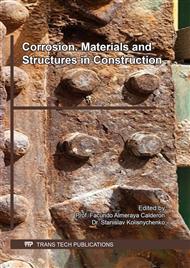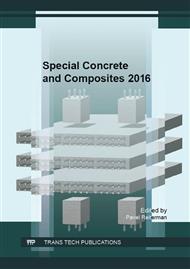p.18
p.27
p.33
p.38
p.44
p.52
p.59
p.66
p.72
Resistance of Surface Layers of Concrete against Aggressive Environment
Abstract:
The article deals with the corrosive effects of acids on the selected surface layers of concrete with/ without an epoxy coating. Concrete sample was placed in extreme environments, which represented the 40% sulphuric acid solution. In addition to measuring surface degradation of concrete, this work focused on the depth of acid penetration into the sample. It can be concluded that the long-term effects of aggressive environments severely degrades the concrete surface on the samples causing corrosion of Type II.
Info:
Periodical:
Pages:
44-51
DOI:
Citation:
Online since:
December 2016
Authors:
Keywords:
Price:
Сopyright:
© 2017 Trans Tech Publications Ltd. All Rights Reserved
Share:
Citation:



